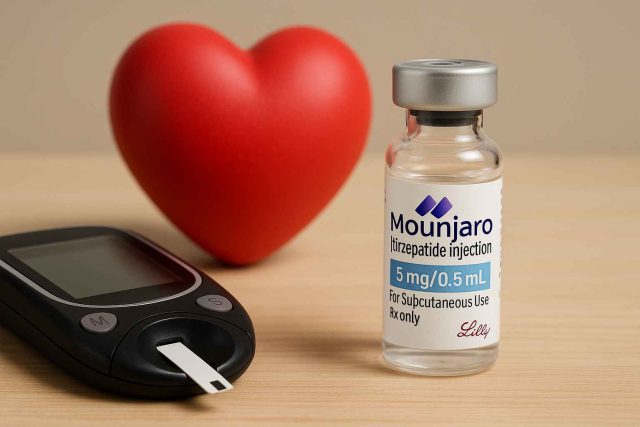Could your diabetes treatment also protect your heart? In a landmark trial comparing popular GLP-1 receptor agonists, Mounjaro (tirzepatide) has shown promising cardiovascular benefits, igniting fresh conversations around how Type 2 diabetes therapies can also impact heart health. As diabetes care increasingly prioritizes holistic outcomes, this latest study marks a critical development for patients and clinicians alike.
Table of Contents
- Mounjaro vs. Trulicity: A Landmark Comparison
- Understanding the Heart Health Impact
- Implications for Type 2 Diabetes Treatment
- What This Means for Patients and Providers
- Conclusion
- FAQs
Mounjaro vs. Trulicity: A Landmark Comparison
Mounjaro, a dual GIP and GLP-1 receptor agonist from Eli Lilly, was directly compared to Trulicity (dulaglutide) in the SURPASS-CVOT trial. This head-to-head study included over 13,000 adults with Type 2 diabetes and established cardiovascular disease. It aimed to determine whether Mounjaro offered superior cardiovascular outcomes compared to Trulicity, a widely prescribed GLP-1 agent.
The results were notable. Participants on Mounjaro experienced a 20% lower risk of major adverse cardiovascular events (MACE), which includes heart attack, stroke, and cardiovascular-related death. This places Mounjaro in the spotlight, potentially redefining treatment priorities for patients with both diabetes and elevated cardiovascular risk.
Unlike prior studies that focused solely on glucose reduction or weight loss, SURPASS-CVOT offers compelling real-world relevance by focusing on outcomes that matter most: heart health and longevity.
Read more about GLP-1 therapies on Diabetes in Control
Understanding the Heart Health Impact
So what drives Mounjaro’s apparent advantage in heart protection? Researchers suggest that the drug’s dual incretin mechanism—targeting both GIP and GLP-1 receptors—may offer enhanced metabolic and anti-inflammatory effects compared to GLP-1-only therapies like Trulicity.
For instance, patients in the Mounjaro group saw not only better A1C reductions but also more significant weight loss, reduced blood pressure, and improved lipid profiles. These are all critical contributors to better heart outcomes, especially in those with existing cardiovascular conditions.
Moreover, inflammation and insulin resistance—common among individuals with Type 2 diabetes—are known risk factors for heart disease. By improving both glycemic control and metabolic flexibility, Mounjaro may be reducing cardiovascular strain more effectively than earlier generation drugs.
The trial adds to a growing body of evidence that diabetes medications can and should be evaluated through a cardiovascular lens. It’s not just about lowering blood sugar anymore—it’s about protecting the heart as well.
For clinical guidance, visit Healthcare.pro to connect with licensed professionals.
Implications for Type 2 Diabetes Treatment
The findings from the SURPASS-CVOT trial are likely to have ripple effects across treatment guidelines and payer decisions. Not only does Mounjaro offer superior glucose and weight control, but now it has demonstrated a significant cardiovascular advantage over an established therapy.
For endocrinologists and primary care physicians, this means a paradigm shift in how frontline diabetes care is approached. Rather than prescribing based solely on A1C targets, doctors may begin prioritizing medications with proven heart health benefits.
Additionally, these findings will likely influence insurance coverage decisions. Payers may begin favoring Mounjaro over alternatives when covering medications for patients with both diabetes and heart disease, given the reduction in costly cardiovascular events.
In contrast to drugs that offer glycemic benefits alone, medications like Mounjaro—now shown to support cardiovascular outcomes—could play a larger role in value-based care strategies and long-term cost savings for health systems.
What This Means for Patients and Providers
For patients living with Type 2 diabetes and cardiovascular disease, the results of this trial offer new hope. Instead of managing these conditions in silos, treatments like Mounjaro allow for a more integrated approach—helping patients live longer, healthier lives.
However, providers must navigate emerging questions: Should all high-risk patients be switched to Mounjaro? Are there subgroups who benefit more? What are the long-term safety considerations?
These are valid concerns, and while Mounjaro has a strong safety profile, real-world data post-approval will remain critical. Side effects such as gastrointestinal discomfort, although generally mild, must be weighed against the potential for reduced cardiovascular risk.
Shared decision-making will remain key. Patients and providers should have open conversations about risks, benefits, and long-term goals—particularly when considering a switch from existing GLP-1 therapies.
Lastly, it’s essential that access issues are addressed. As more people become aware of Mounjaro’s heart benefits, healthcare systems must ensure equitable access, especially among underserved populations who face the highest burdens of both diabetes and heart disease.
Explore more articles on diabetes treatment evolution at Diabetes in Control
Conclusion
The SURPASS-CVOT trial marks a major milestone in diabetes care by highlighting Mounjaro’s unique ability to enhance heart health while controlling blood glucose. With a 20% reduction in major cardiovascular events, it stands out not just as a glucose-lowering agent but as a potentially life-saving therapy for millions.
As new data continues to emerge, the clinical community must adapt to integrate these findings into everyday care. For patients, Mounjaro offers a promising future—where managing diabetes means not only better sugar control but also a healthier heart.
FAQs
What is the SURPASS-CVOT trial?
The SURPASS-CVOT was a head-to-head trial comparing Mounjaro and Trulicity in people with Type 2 diabetes and cardiovascular disease to evaluate heart health outcomes.
How does Mounjaro benefit heart health?
Mounjaro appears to reduce cardiovascular events by improving blood sugar, reducing weight, lowering blood pressure, and improving lipid levels, all of which contribute to better heart health.
Who should consider switching to Mounjaro?
Patients with Type 2 diabetes who are at high cardiovascular risk or currently taking a GLP-1 therapy may benefit from discussing Mounjaro with their provider.
Is Mounjaro approved for cardiovascular protection?
While the SURPASS-CVOT results are promising, formal regulatory updates may be needed to reflect heart protection on Mounjaro’s label. Always consult your provider for personalized advice.
Where can I learn more about Mounjaro and heart health?
Reputable sources like Healthcare.pro and Diabetes in Control provide up-to-date information and expert insights.
Disclaimer
This content is not medical advice. For any health issues, always consult a healthcare professional. In an emergency, call 911 or your local emergency services.
